Constructing the Uzbek State
Contemporary Central Asia: Societies, Politics, and Cultures
Series Editor
Marlene Laruelle, George Washington University
At the crossroads of Russia, China, and the Islamic world, Central Asia remains one of the worlds least-understood regions, despite being a significant theater for muscle-flexing by the great powers and regional players. This series, in conjunction with George Washington Universitys Central Asia Program, offers insight into Central Asia by providing readers unique access to state-of-the-art knowledge on the region. Going beyond the media clichs, the series inscribes the study of Central Asia into the social sciences and hopes to fill the dearth of works on the region for both scholarly knowledge and undergraduate and graduate student education.
Titles in Series
Afghanistan and Its Neighbors after the NATO Withdrawal , edited by Amin Saikal and Kirill Nourzhanov
Integration in Energy and Transport: Azerbaijan, Georgia, and Turkey , by Alexandros Petersen
Kazakhstan in the Making: Legitimacy, Symbols, and Social Changes , edited by Marlene Laruelle
The Origins of the Civil War in Tajikistan: For the Soul, Blood, Homeland, and Honor, by Tim Epkenhans
Rewriting the Nation in Modern Kazakh Literature: Elites and Narratives , by Diana T. Kudaibergenova
The Central AsiaAfghanistan Relationship: From Soviet Intervention to the Silk Road Initiatives , edited by Marlene Laruelle
Eurasias Shifting Geopolitical Tectonic Plates: Global Perspective, Local Theaters , by Alexandros Petersen
The New Geopolitics of the South Caucasus: Prospects for Regional Cooperation and Conflict Resolution , edited by Shireen T. Hunter
Constructing the Uzbek State: Narratives of Post-Soviet Years , edited by Marlene Laruelle
Constructing the Uzbek State
Narratives of Post-Soviet Years
Edited by Marlene Laruelle
Lexington Books
Lanham Boulder New York London
Published by Lexington Books
An imprint of The Rowman & Littlefield Publishing Group, Inc.
4501 Forbes Boulevard, Suite 200, Lanham, Maryland 20706
www.rowman.com
Unit A, Whitacre Mews, 26-34 Stannary Street, London SE11 4AB
Copyright 2017 by Lexington Books
All rights reserved. No part of this book may be reproduced in any form or by any electronic or mechanical means, including information storage and retrieval systems, without written permission from the publisher, except by a reviewer who may quote passages in a review.
British Library Cataloguing in Publication Information Available
Library of Congress Cataloging-in-Publication Data
Names: Laruelle, Marlene, editor.
Title: Constructing the Uzbek state : narratives of post-Soviet years / edited by Marlene Laruelle
Description: Lanham, Maryland : Published by Lexington Books, an imprint of The Rowman & Littlefield Publishing Group, Inc., 2017. | Series: Contemporary Central Asia : societies, politics, and cultures | Includes bibliographical references and index.
Identifiers: LCCN 2017048357 (print) | LCCN 2017044944 (ebook) | ISBN 9781498538374 (electronic) | ISBN 9781498538367 | ISBN 9781498538367 (cloth : alk. paper)
Subjects: LCSH: UzbekistanPolitics and government1991- | UzbekistanForeign relations1991- | UzbekistanEconomic conditions1991- | UzbekistanReligion. | UzbekistanSocial conditions1991
Classification: LCC DK948.865 (print) | LCC DK948.865 .C66 2017 (ebook) | DDC 958.7086dc23
LC record available at https://lccn.loc.gov/2017048357
 The paper used in this publication meets the minimum requirements of American National Standard for Information SciencesPermanence of Paper for Printed Library Materials, ANSI/NISO Z39.48-1992.
The paper used in this publication meets the minimum requirements of American National Standard for Information SciencesPermanence of Paper for Printed Library Materials, ANSI/NISO Z39.48-1992.
Printed in the United States of America
Contents
Introduction
Marlene Laruelle
Over the past few decades, Uzbekistan has attracted the attention of the academic and policy communities for several reasons. First, its geostrategic importancethe country is located between Russia and China, borders Afghanistan, and has the largest army in Central Asia (although Kazakhstan is rapidly gaining on it). Second, it plays a critical role in shaping or unshaping Central Asia as a region, as Uzbekistan borders all other Central Asian states and has an ethnic diaspora in each of them. Tashkents views on regional integration and its choice of isolationism have impacted the whole region. Third, it hosts the largest population in Central Asia: every other Central Asian is Uzbek (thirty million inhabitants of the regions sixty million), therefore Uzbekistans political, social, and cultural evolutions largely exemplify the transformations of the region as a whole. Moreover, Uzbekistan is rich, at least potentially, in terms of energy, minerals, and agriculture; it has maintained some industrial production and has important trade potential.
More than twenty-five years after the collapse of the Soviet Union, evaluating Uzbekistans post-Soviet transformation remains complicated. Practitioners and scholars have seen access to sources, data, and fieldwork progressively restricted since the early 2000s. On the one hand, the country shows signs of progress in terms of infrastructure development and integration into international systems. Uzbekistan is now part of major international organizations, through which it demonstrates its capacity for independent decision-making in the face of various influences and pressures. However, its system of governance seems to have reached its limit and now faces serious challenges in terms of inventing a new economic future, reformulating the statesociety social contract, and integrating social and cultural changes into the state-centric grand narrative.
This volume analyzes the transformations of post-Soviet Uzbekistan using a multidisciplinary perspective, drawing on political science, international relations, political economy, anthropology, geography, and cultural studies. This collective discussion is neither final nor nondebatable. Rather, it represents an attempt to engage in an analysis of the empirical evidence and theoretical assumptions in an academic setting.
A Post-Karimov Uzbekistan
From 1989 to 2016, Islam Karimov presided over Uzbekistan and its destiny. His death, announced on September 2, 2016, reopened the future of the country and multiple possible paths of development. One year after the death of the father of the nation, there have been modest yet enlightening changes, more significant than those that occurred in Turkmenistan after the sudden death of President Saparmurat Niyazov in 2006.
The new Uzbek president, Shavkat Mirziyoyev, is a member of the countrys political elite. He became prime minister in 2003 and held that post until he assumed the presidency in 2016. He is emphasizing continuity and has issued a decree to immortalize Islam Karimovs memory by proclaiming his birthday, September 30, as National Commemoration Day and his death, September 2, as First Presidents Commemoration Day. Twenty-five roads, factories, airports, and universities have been renamed in Karimovs honor, including the Tashkent Airport and the capitals Technical University, as well as the General Motors plant located in the small city of Asaka in the Fergana Valley. In addition, Mirziyoyev also ordered a memorial complex built around Karimovs tomb in his native town of Samarkand.
As expected, the new presidents political style is quite similar to his predecessors, although considerably less focused on his own persona. For the time being, Mirziyoyev is promoting a more collegial and less personalized style. Just as the Turkmen regime did when a new president came to power in 2007, Uzbekistan released a few symbolic political prisoners in late 2016. Mirziyoyev also made an obvious overture to members of the elite who had been arrested by the previous administration by rehabilitating several of them. These political developments demonstrate the aging elites continued stronghold and the return to power of shady personalities. They also confirm Mirziyoyevs need to secure the elites loyalty by renewing relations with those who had been partially cast aside and whose confidence he needs to gain.
Next page
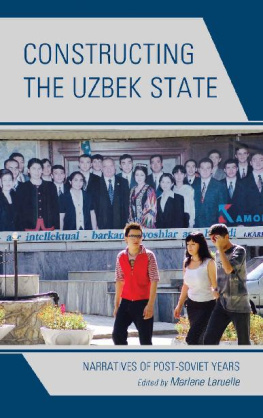

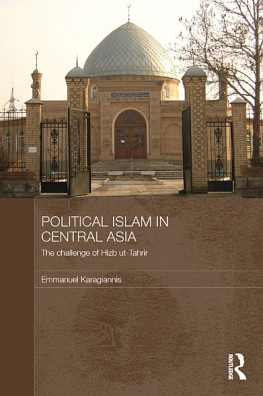
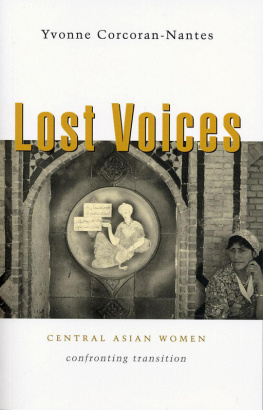
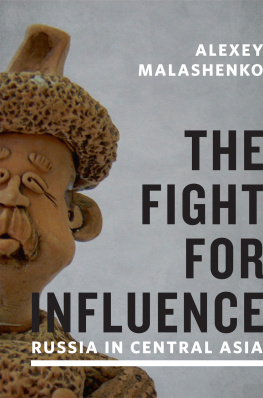
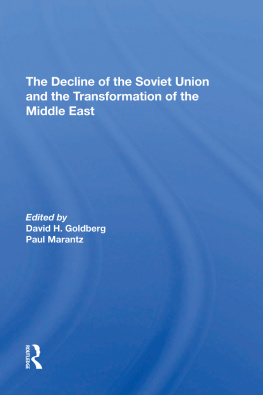

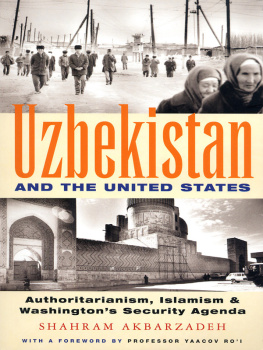
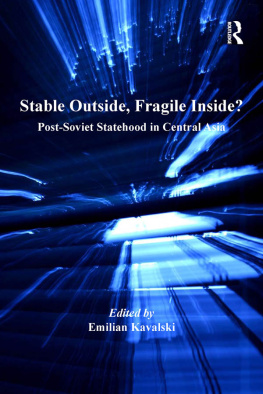
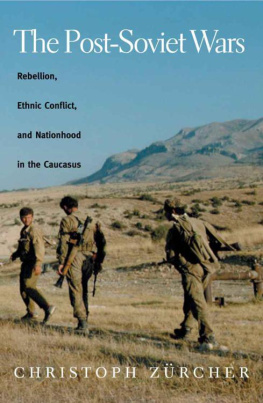
 The paper used in this publication meets the minimum requirements of American National Standard for Information SciencesPermanence of Paper for Printed Library Materials, ANSI/NISO Z39.48-1992.
The paper used in this publication meets the minimum requirements of American National Standard for Information SciencesPermanence of Paper for Printed Library Materials, ANSI/NISO Z39.48-1992.